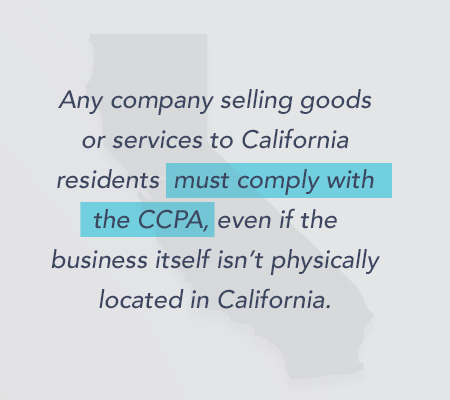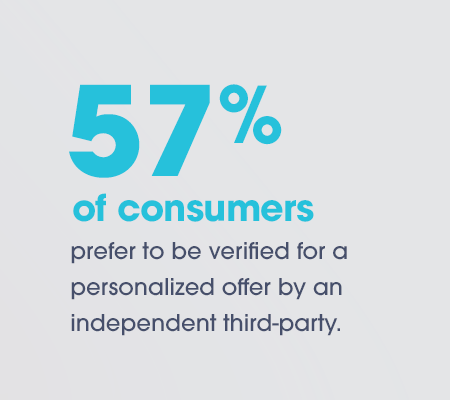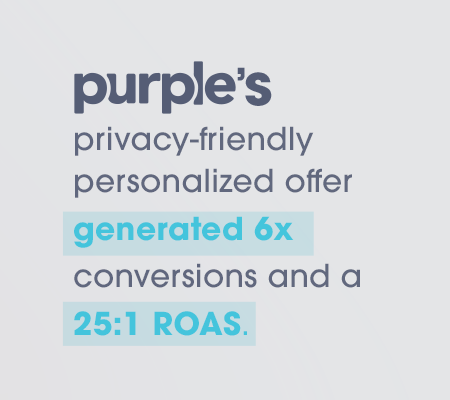How to Create Personalized Marketing in the Wake of CCPA

Marketers are constantly leveraging consumer data to create targeted marketing. But today’s consumers highly value their privacy and will punish brands that don’t protect their personal information. More than 4 in 5 consumers say they will do business elsewhere if they don’t trust that a company is responsibly handling their data.
The California Consumer Privacy Act (CCPA) includes a host of regulations that raise the stakes even higher. Marketers need to understand the impact the CCPA has on their personalization efforts. And they need strategies for delivering personalized marketing that respects the regulations—and consumers’ demands for privacy.
The CCPA Gives Consumers Greater Control Over Their Data
The CCPA is an expansive new privacy law that takes effect on January 1, 2020. It gives California consumers the right to:
- Know what personal information is collected, used, shared, or sold. This applies to both categories and specific pieces of personal information.
- Delete personal information that a business and a business’s service provider hold.
- Opt-out of the sale of their personal information to third parties. Children under the age of 16 must provide opt-in consent, and a parent or guardian must provide this consent for children under 13.
- Avoid discrimination in terms of price or service when they exercise their privacy rights under the law.
What the CCPA Means for Brands
Any company selling goods or services to California residents must comply with the CCPA, even if the business itself isn’t physically located in California. To fall under the purview of the CCPA, a business must also meet at least one of the following three criteria:
- Have $25 million or more in annual revenue.
- Possess the personal data of more than 50,000 “consumers, households, or devices.”
- Earn more than half of its annual revenue selling consumers’ personal data.
Businesses responsible for complying with the CCPA have their work cut out for them. To give consumers the rights listed above, companies must:
- Provide notice to consumers at or before data collection.
- Create procedures that enable consumers to know what personal data is used, opt-out of the sale of their personal data, and request that it be deleted.
- Respond to the above consumer requests within specific timeframes.
- Verify the identities of customers who make requests.
- Maintain a record of requests and how the companies responded to them.
- Disclose any financial incentives offered for the sale or retention of customer information.

Complying with CCPA won’t be cheap. Compliance Week reports the total estimated costs will be $55 billion. The projected cost per company could depend on the number of employees, but smaller businesses will feel the financial pinch more strongly.
A New Form of Personalized Marketing That Aligns with the CCPA
Identity marketing is a new form of personalization in which brands use personalized offers to engage consumer tribes, such as students, seniors, teachers, and the military. In identity marketing campaigns, brands invite these groups to enjoy a personalized offer and use an identity marketing platform to confirm consumer eligibility.
Identity marketing helps companies meet CCPA requirements because it:
01 Relies on a Consent-Based Approach
Unlike behavioral marketing that collects user behavior through third-party sites—the type of business the CCPA aims to protect against—identity marketing adheres to a completely opt-in process. For example, Comcast recently launched a personalized offer for students. Students who want to redeem it opt-in through the verification process.
This consent-based approach changes the brand-consumer data relationship. It creates a clear value exchange for how the data will be used and what consumers will get in return.
02 Uses a Privacy-Friendly Approach to Data Collection
Brands that use an identity marketing platform to confirm eligibility for personalized offers are verifying customers the way consumers want. Research shows that 57% of consumers prefer to be verified for a personalized offer by an independent third-party, rather than a brand’s customer service representatives.

Also, personal information gathered in an identity marketing campaign is never shared or sold. In fact, the identity marketing platform encrypts all data and puts it through a one-way “hash” process so it can never be reused for marketing purposes.
03 Requires Only Basic Customer Information to Verify Identities
The CCPA broadly defines personal information as data that “identifies, relates to, describes, is reasonably capable of being associated with, or could reasonably be linked, directly or indirectly, with a particular consumer or household.” This includes a consumer’s biometric information, online activity, and even geolocation data.
Identity marketing supports this CCPA requirement by collecting a minimal amount of data, and only the information more than two-thirds of consumers are willing to provide, such as their name and email address.
Customer verification in an identity marketing program doesn’t require a social security number, and that’s good news. Only 18% of consumers said they would be willing to provide one.
Prepare for the Future Now
Many states have passed or are proposing their own data privacy laws. In July, New York signed its SHIELD Act into law, which sets greater data security standards for businesses that handle personal information. As we move into a new decade, more states and countries will enact data privacy laws.
Marketers can view these regulations as an opportunity to build consumer trust by responsibly handling and safeguarding personal information. As CCPA (and other laws) come into effect, identity marketing can help brands protect data privacy and deliver personalized offers that consumers will value. That’s good for business, no matter where your consumers live.
Protecting Customer Privacy: A Success Story
Purple, the maker of the “World’s First No Pressure Mattress,” wanted to provide a personalized offer to the military. Initially, they manually verified shoppers, but this was time-consuming and created friction in the purchase process.
Mattress,” wanted to provide a personalized offer to the military. Initially, they manually verified shoppers, but this was time-consuming and created friction in the purchase process.
Alisa Gammon, Purple’s performance marketing director, knew the program would see even greater results if she promoted it more widely. But to do this, she knew she needed a verification solution that supported her vision for expansion.
She considered working with an affiliate to process the discount, but that would have meant putting Purple’s customers—and their data—in the hands of a third party.
Instead, Alisa relaunched Purple’s military discount using an identity marketing platform to verify eligibility, and the results were remarkable. Her new identity marketing campaign:
- Increased conversion rates by 6x.
- Saved customer service 49 hours a month.
- Generated ROAS of 25:1.

Best of all, this personalized campaign required Purple to collect only basic customer data that’s never shared with an affiliate who would use it for their own marketing. And using an identity marketing platform allowed Purple to avoid the risks involved in maintaining personal information.
Read our e-book: The Definitive Guide to Identity Marketing